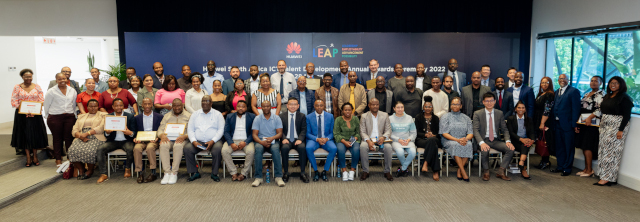ICT skills development is critical for South Africa to participate in the Fourth Industrial Revolution (4IR) and reap the benefits of a digital economy. This was the consensus of various speakers at Huawei South Africa’s ICT Talent Development annual awards ceremony at its Woodmead campus yesterday.
The event celebrated the higher education partner institutions and facilitators of the Huawei ICT Academy Programme, which was established to identify, cultivate, and develop the best talent through collaboration between industry, educational institutions, and the public sector.
“The ICT sector is growing fast and we must respond to its needs, especially when it comes to the future workforce. The Huawei ICT Academy is designed to bridge the gap between the skills demand of enterprises and the supply from schools,” said Huawei Director of South Africa Enterprise Business, Zhang Yi. “Huawei hopes to provide more technical and skilful talent, more advanced technologies and more emphasis on innovation and entrepreneurship to support the sustainable development of South Africa’s ICT industry.”
South Africa’s Minister of Higher Education, Science and Innovation, Dr. Blade Nzimande, who delivered a keynote address at the event, noted that the imperatives of 4IR require drastic digital transformation and skills development to support a digital economy. “Digital transformation cannot happen without skills acquisition,” the Minister said on Monday.
“Partnerships between enterprise, universities and colleges are an important way to maximise skills development in South Africa, as they have the potential to align curriculum design to the skills needed by industry,” said Nzimande. “This is particularly important for young people between the ages of 15 and 24, whose unemployment remains high at 61%, as this is the most critical period in any person’s life in determining whether you transition into a better life or remain trapped in poverty.”
The Department of Higher Education, Science and Innovation has identified significant skills gaps in the digital economy in areas such as cloud architecture, cybersecurity, data science, blockchain, machine learning, and robotic automation.
“The skills provided through initiatives such as Huawei’s ICT Academy are part of the future of South Africa as we’ll need lots of people who have acquired different levels of skills in order for the entire country to reap the benefits of 4IR,” he added. “We don’t only want to train people who are consumers of 4IR technologies, we want to train people who learn to be innovators and who will contribute to creating new solutions and technologies.”
The minister lauded Huawei’s holistic involvement in supporting the department’s Post School Education and Training sector including working with TVET colleges and universities.
“I got a report that you are involved in the whole spectrum of ICT and digital capacity development such as training certification, curriculum development and customisation, updates on latest trends, connecting students with employers, internship opportunities offered to students by Huawei and its partners, work placement, training of the trainer programme, e-learning resources, and simulation tools. This is what we need in South Africa,” he said.
Through the ICT Academy Programme, Huawei has partnered with 72 academies in South Africa to provide training, development, and internationally accredited certification to instructors and students across the country. Today, more than 150 instructors have participated in the Instructor Training Programme, more than 3 500 students have participated in online training programmes and almost 5 000 students have enrolled in this year’s ICT competition.
“This programme acts as a bridge between enterprises and academic institutions to build a talent ecosystem for the ICT industry by preparing students with the latest technology and practical skills to make them more employable and help kick start their career,” said George Mothapo, Principal at Sedibeng TVET College.
During the event, Professor Pitshou Ntambu Bokoro, Head of the University of Johannesburg’s Department of Electrical and Electronic Engineering Technology, noted that initiatives such as the Huawei ICT Academy, ICT Centre, and ICT Talent Development were essential in diffusing ICT skills across the length and breadth of South Africa and, by extension, in closing the gap created by the digital divide.
Lecturer and PhD Candidate in Computer Science at the University of Venda, Kudakwashe Madzima, added: “The physical location of our university, is far and isolated from the big cities, making it difficult to develop meaningful relationships with big players in the ICT industry. That’s why when we heard about the Huawei ICT Talent Development programmes, we quickly jumped at the opportunity to improve the delivery of relevant practical ICT skills to our students.”
Huawei has developed more than 1 500 ICT Academies across the globe, with more than 3 000 instructors certified and more than 125 000 students cultivated yearly. Huawei South Africa has also developed the Graduate Institute of South Africa as the first Academy Support Centre and 40 Huawei Clubs from various institutions which play significant roles in providing operational support to the ICT Academy Programme.

.jpg)




